In 1989, Ayatollah Ruhollah Khomeini, then Iran’s supreme leader, issued a fatwa against Salman Rushdie in response to The Satanic Verses, which he deemed blasphemous. The next year, while under police protection and separated from his young son, the controversial author did something unexpected: He published a novel for children. A hybrid of Eastern and Western influences that draws on classic fantasy tales as diverse as The Wizard of Oz and One Thousand and One Nights, Haroun and the Sea of Stories follows the titular 12-year-old boy—who resides in an ancient Eastern city “so ruinously sad that it had forgotten its name”—on a quest to restore his storyteller father’s lost gift for narrative. That the novel would be, in large part, an allegory for the relationship between art, tyranny and censorship was probably inevitable. But beyond its timely context, Rushdie’s beautiful descriptions, playful use of language, colorful characters and irrepressible sense of humor make for the kind of timeless, ageless adventure story that appears only a few times in a generation. —Judy Berman
Buy Now: Haroun and the Sea of Stories on Bookshop | Amazon
- The 100 Most Influential People of 2024
- The Revolution of Yulia Navalnaya
- 6 Compliments That Land Every Time
- What's the Deal With the Bitcoin Halving?
- If You're Dating Right Now, You're Brave: Column
- The AI That Could Heal a Divided Internet
- Fallout Is a Brilliant Model for the Future of Video Game Adaptations
- Want Weekly Recs on What to Watch, Read, and More? Sign Up for Worth Your Time
